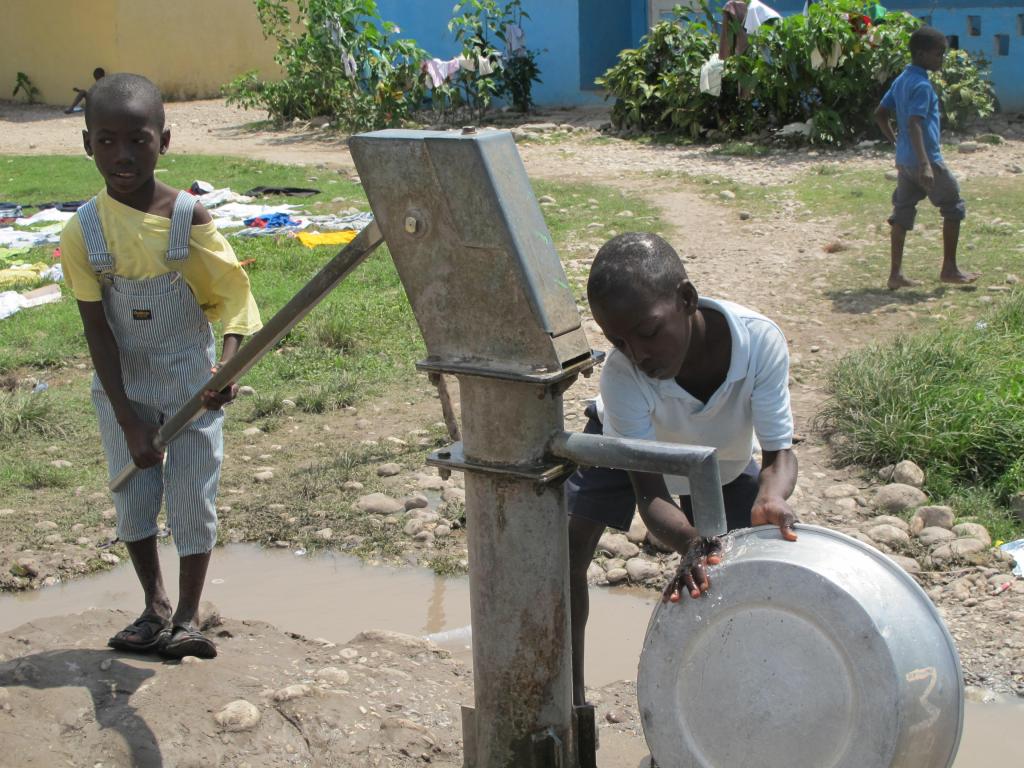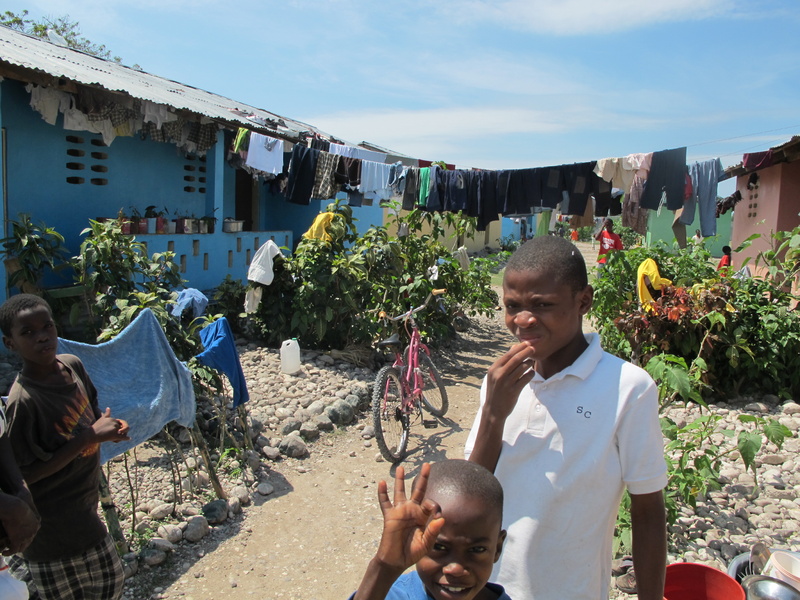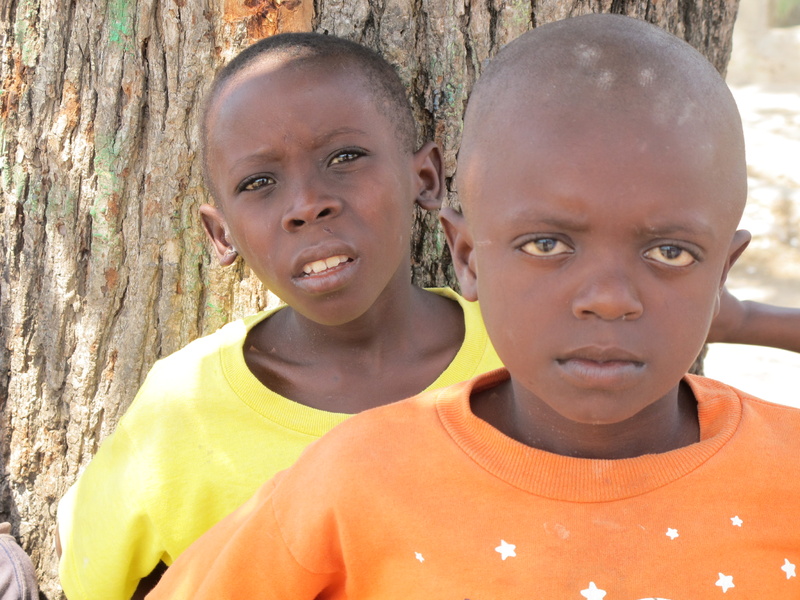LES CAYES, Haiti – Saturday morning, as the Rev. Marc Boisvert rode in an SUV through the busy streets of downtown Les Cayes, a young man on a motorcycle pulled up alongside the open window.
“Respe, mon Pere!” the man shouted to Boisvert.
“Merci,” replied Boisvert before the motorcyclist turned sharply and zoomed down a side street.
What had the man said?
“He said, ‘Respect to you, Father,’” Boisvert said.
The compliment was well earned.
He was born and grew up in Lewiston. He went to a seminary high school in Bucksport.
He’s served as pastor at Roman Catholic churches in Castine and Stonington, a chaplain at Maine Maritime Academy and as a Navy chaplain at, of all places, Guantanamo Bay in Cuba.
But that’s all in his distant past. Twelve years, two months and six days ago — he knows because it happened on Jan. 1, 1998 — Boisvert left life as he knew it and came to the poorest country in the Western Hemisphere.
Not to visit. Not to burnish his ministerial resume with a year or two of missionary work. Not to turn himself into a local icon, although that clearly has happened whether he likes it or not.
“I still love Maine, but Haiti is my home now,” Boisvert said. “I’ll be buried here.”
Much of Maine’s attention has been focused these past several weeks on the Sea Hunter, the ship from Maine that surmounted obstacles both natural and man-made to deliver nearly 200 tons of relief supplies to this port on the south coast of Haiti.
By the time all of the cargo is offloaded in the next day or two, half of it will come here to Hope Village.
Known in Haiti as Pwoje Espwa (Project Hope), the orphanage and community assistance program founded by Boisvert sits on a sprawling 120-acre campus 20 minutes out of Les Cayes.
It is, especially by Haitian standards, a Herculean achievement.
The orphanage, normally home to about 600 boys, has swelled to almost 800 as refugees flow in daily from the Jan. 12 earthquake that ravaged the densely populated area around Port-au-Prince.
Hope Village’s school, which Boisvert founded after he tried unsuccessfully to persuade teachers in town to stop beating his boys bloody for not finishing their homework, now educates close to 1,300 students. In addition to the orphans here, 500 pupils come from the surrounding community.
The program’s prison outreach operation saved many a life after inmates at the Les Cayes prison rioted, unable to get information about their families, in the wake of the earthquake. Guards quelled the uprising by shooting several inmates in their tiny, overcrowded cells, Boisvert said.
“We were the only ones they allowed in,” Boisvert recalled. “We fed the inmates for three weeks. We had guys with bullets still in their bodies the whole time. It was unbelievable.”
The list goes on.
There’s the home-building program that has provided shelter for more than 100 families in the Les Cayes area.
And the fledgling rehabilitation program aimed at providing prosthetics and vocational training for earthquake amputees.
All told, Hope Village’s 250-person payroll makes it one of the largest employers in southern Haiti.
And its $1.8 million annual operating budget, funded almost entirely through donations from the United Sates and beyond, leaves a significant economic footprint on a region where a “steady income” can average as little as a dollar a day.
At the center of it all sits the 59-year-old Boisvert.
Bearded and blue-jeaned with a quick wit and penetrating eyes, he navigates Haiti’s currents of corruption, inefficiency and political intrigue more like a savvy politician than an Oblate of the Immaculate Conception priest.
It was not a vocation that came easily.
After graduating from St. Joseph’s Seminary High School in Bucksport, Boisvert enrolled in an Oblate seminary in Massachusetts for two years. Then he dropped out.
“I fell in love,” Boisvert explained. “It didn’t work out.”
He came home to Maine and took a job as a social worker at St. Mary’s Hospital in Lewiston. His fluent French and empathetic manner quickly made him a favorite among older patients — and got him noticed by the hospital chaplain.
“They would talk and I would listen and explain things and they would feel better and they would ask for me,” he said. “And they’d tell the chaplain, ‘Oh, I was talking to Marc, and he made me feel good.’“
Go back to the seminary, the chaplain finally told him. It’s your true calling.
“He was right,” Boisvert said.
And so in 1984, at the age of 33, Marc Boisvert forever became “Father Marc.”
His pastoral work at Our Lady of Hope in Castine and Mary Star of the Sea in Stonington led to a chaplaincy at Maine Maritime Academy. That, in turn, led to a seven-year stint in the Navy.
He served in Operation Desert Storm in 1991 and then took a post at the U.S. Naval Station at Guantanamo Bay.
Once again, his Franco-American heritage came in handy.
French-and-Creole-speaking Haitians, fleeing political strife in their nearby homeland, poured into Guantanamo during the mid-1990s. Overwhelmed, military officials frequently called on Boisvert to serve as an interpreter.
“These people would tell me about these horrible things going on back in Haiti,” Boisvert said. “The things they described were so bad that I thought they were exaggerating, so I resolved to go over there when I could and see for myself.”
He finally made the trip in 1998. And alas, the refugees’ stories of abject poverty, widespread disease and an overall sense of hopelessness proved heartbreakingly true.
“I’ve said it many times — the biggest enemy of the people here is their government,” Boisvert said. “I mean you can blame U.S. intervention in the past and the CIA and all that kind of crap, but the fact is (Haitian government officials) don’t have it together. They’ve never had it together.”
Resigning his military commission, Boisvert arrived first in Port-au-Prince and soon found his way 110 miles southeast to this city of 80,000-plus people. Now swelled with refugees from Port-au-Prince, Les Cayes has long been the social and economic center of southern Haiti.
Boisvert asked for and received the local bishop’s permission to take an abandoned seminary in the middle of Les Cayes’ crowded downtown district and turn it into an orphanage for boys left to fend for themselves on the street.
“We got up to 250 kids there,” he said. “Then I decided it was time to buy some land.”
The new campus, launched in 2004 with one modest building and a small agricultural project, has blossomed in six years into some 50 buildings, a guava and citron orchard, fields of corn, watermelon and eggplant.
But most striking, by far, are the hundreds of smiling, chattering children.
Wherever Boisvert goes, they surround him with greetings of “FaTHER! FaTHER!” and “Mon Pere! Bonjour, mon Pere!”
The children, all but a handful boys, crave affection. And Boisvert, with an uncanny knack for remembering their individual stories, readily provides it.
“This is Stanley,” Boisvert said, hoisting a tiny boy up off the ground. “He’s a pain in the neck — but he’s an honest pain in the neck.”
As quick as he might be to comfort, however, Boisvert doesn’t hesitate to chastise the boys and, if necessary, discipline them for mischief or rule breaking.
“Hey!” Boisvert hollered upon spotting two young boys itching to climb aboard a parked motorcycle.
“Ah-ah-ahhhh!” Boisvert said, waving the pair farther away with each syllable. Eyes fixed on Boisvert, they moved one foot, then two, then three away from the vehicle.
“Merci,” Boisvert said with a nod. The boys smiled back.
Boisvert’s philosophy with the children is simple.
“For the little kids, it’s the basic stuff,” Boisvert said. “The first step is to let them play, let them have a pure childhood.”
And the second step?
“To let them dream,” he replied.
Hence an elementary education leads directly to vocational training in carpentry, welding, masonry, electricity, plumbing or tailoring — all aimed at providing each boy a future by the time he leaves Hope Village at age 20.
“Every kid has to learn a skill so he can at least go out and try to earn some money,” Boisvert said.
Beyond the educational program, just keeping the entire operation running is no easy feat.
The kitchen’s eight charcoal pits and four gas stoves produce between 3,000 and 4,000 hot meals per day.
The two dozen dormitories, supervised by adult staff and secured behind a guarded concrete wall, house up to 40 children each.
It’s not uncommon for younger boys, put to bed in their own bunks at night, to be found huddled two and three to a bed by morning.
‘They’re looking for human contact, for affection,” Boisvert said. “Most of them have never had that in their lives. A lot of these kids have no value in the communities they come from.”
Boisvert cringes at the notion that his work here makes him larger than life back in the United States.
Lately he’s been pressuring his board of directors, which operates under the nonprofit banner “Free the Kids,” to take their fundraising emphasis off him and put it squarely on the kids.
He’s also anxious to have a succession plan in place.
“What if I die next month?” Boisvert asked, throwing up his hands. “The kids will still be here.”
Peter Faford, a Roman Catholic deacon from Worcester, Mass., who moved to Hope Village two years ago with his wife, Linda, serves as Hope Village’s project director.
Faford, 65, said behind Boisvert’s strong personality lies the real secret of his success — a deep, spiritual humility.
“The minute you start making it about yourself, the ministry is over,” Faford said. “Father Marc very rarely thinks about himself. It’s always the kids, always the kids.”
Faford, a retired corporate manager, also noted that Boisvert’s modest life here — he lives in his own home on the edge of Hope Village — is a far cry from the life he could be living.
“He could be in Florida relaxing and saying Mass on Sunday. He could be living off his military pension,” Faford said. “But he left all of that to work with street kids.”
And here he will stay.
Boisvert said he’s serious about being buried here — right next to the three boys who have died at Hope Village (two from disease, one from accidental drowning in a nearby stream).
He still has sisters back in Maine, where he returns each year for a fundraising visit. He still misses lobster. He’s yet to realize his dream of spending a winter skiing.
But move back? Now? Ever?
“Why would I?” Boisvert asked, throwing up his hands. “Will Maine give me visas for 800 kids? I don’t think so.”
Besides, home is where your soul is.
“This is God’s work,” Boisvert said. “This is what God wants me to do.”
Columnist Bill Nemitz can be contacted at 791-6323 or at:
bnemitz@pressherald.com
Send questions/comments to the editors.







Comments are no longer available on this story